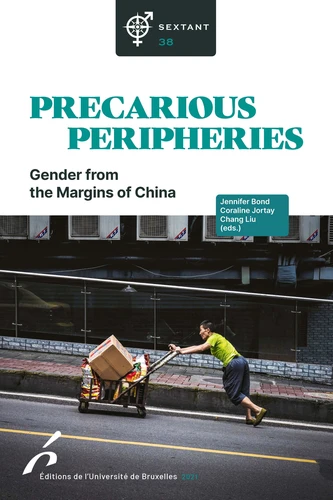Jennifer Bond is a Lecturer in Education at University College London. She is a historian of modern China and her research focuses on gender, education, Christianity and diplomacy in the Republican era (1911-1949). She is currently writing a book manuscript which explores the identity negotiations of Chinese girls who attended protestant missionary schools in the early twentieth century
Precarious peripheries. Gender from the Margins of China
Par : , ,Formats :
- Paiement en ligne :
- Livraison à domicile ou en point Mondial Relay indisponible
- Retrait Click and Collect en magasin gratuit
- Réservation en ligne avec paiement en magasin :
- Indisponible pour réserver et payer en magasin
- Nombre de pages148
- PrésentationBroché
- FormatGrand Format
- Poids0.31 kg
- Dimensions16,2 cm × 24,0 cm × 1,0 cm
- ISBN978-2-8004-1777-6
- EAN9782800417776
- Date de parution01/12/2022
- CollectionSextant
- ÉditeurUniversité de Bruxelles
Résumé
The construction and imagination of China's margins - ethnic, political, socio-cultural, geographical, religious - has long engrossed China scholars, from anthropological works such as William Skinner's classic study of historical geography and the macro region model, to travel writers from Marco Polo to San Mao, to ethnographies of Chinese minorities and new Qing histories. In recent years, academic attention has widened its scope to new margins including environmental histories of China's politically contested borders, and the projection of China's soft power in contemporary science fiction that claims space as the newest frontier of the Sinosphere.
However, relatively little attention has been paid to the role of gender in imagining and creating China's shifting centers and peripheries. What and where are these margins and what role does gender play in their construction and imagination ? Who are the inhabitants of the margins : minorities, women, religious groups, itinerants, disabled people and the poor ? In what ways does gender condition their experience of the peripheral spaces in which they operate ? What are the social and gendered implications of traversing these boundaries - personal, political or physical ? How do marginal actors negotiate their place at the borders and what is the impact of their positioning and perspectives on the very conception of Chineseness ? A gendered perspective can better help scholars to transverse and dissect the borders of China, historically, socially, politically and geographically, and throw new light onto their fluid and permeable construction across time and space.
However, relatively little attention has been paid to the role of gender in imagining and creating China's shifting centers and peripheries. What and where are these margins and what role does gender play in their construction and imagination ? Who are the inhabitants of the margins : minorities, women, religious groups, itinerants, disabled people and the poor ? In what ways does gender condition their experience of the peripheral spaces in which they operate ? What are the social and gendered implications of traversing these boundaries - personal, political or physical ? How do marginal actors negotiate their place at the borders and what is the impact of their positioning and perspectives on the very conception of Chineseness ? A gendered perspective can better help scholars to transverse and dissect the borders of China, historically, socially, politically and geographically, and throw new light onto their fluid and permeable construction across time and space.
The construction and imagination of China's margins - ethnic, political, socio-cultural, geographical, religious - has long engrossed China scholars, from anthropological works such as William Skinner's classic study of historical geography and the macro region model, to travel writers from Marco Polo to San Mao, to ethnographies of Chinese minorities and new Qing histories. In recent years, academic attention has widened its scope to new margins including environmental histories of China's politically contested borders, and the projection of China's soft power in contemporary science fiction that claims space as the newest frontier of the Sinosphere.
However, relatively little attention has been paid to the role of gender in imagining and creating China's shifting centers and peripheries. What and where are these margins and what role does gender play in their construction and imagination ? Who are the inhabitants of the margins : minorities, women, religious groups, itinerants, disabled people and the poor ? In what ways does gender condition their experience of the peripheral spaces in which they operate ? What are the social and gendered implications of traversing these boundaries - personal, political or physical ? How do marginal actors negotiate their place at the borders and what is the impact of their positioning and perspectives on the very conception of Chineseness ? A gendered perspective can better help scholars to transverse and dissect the borders of China, historically, socially, politically and geographically, and throw new light onto their fluid and permeable construction across time and space.
However, relatively little attention has been paid to the role of gender in imagining and creating China's shifting centers and peripheries. What and where are these margins and what role does gender play in their construction and imagination ? Who are the inhabitants of the margins : minorities, women, religious groups, itinerants, disabled people and the poor ? In what ways does gender condition their experience of the peripheral spaces in which they operate ? What are the social and gendered implications of traversing these boundaries - personal, political or physical ? How do marginal actors negotiate their place at the borders and what is the impact of their positioning and perspectives on the very conception of Chineseness ? A gendered perspective can better help scholars to transverse and dissect the borders of China, historically, socially, politically and geographically, and throw new light onto their fluid and permeable construction across time and space.


